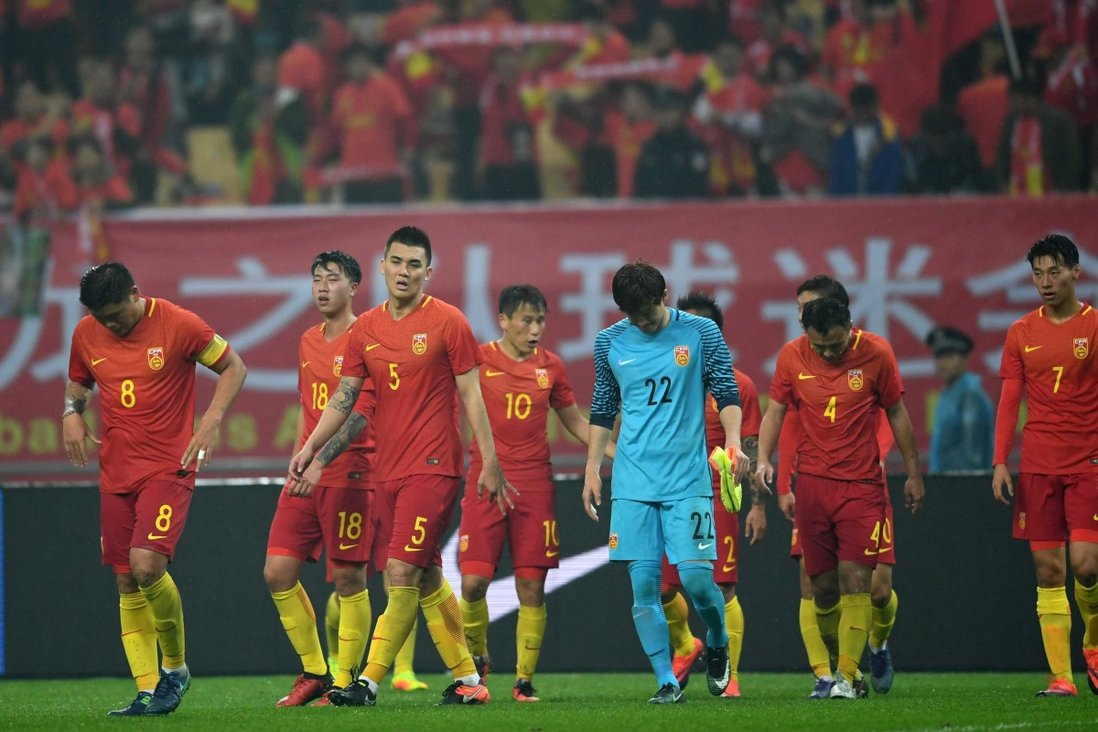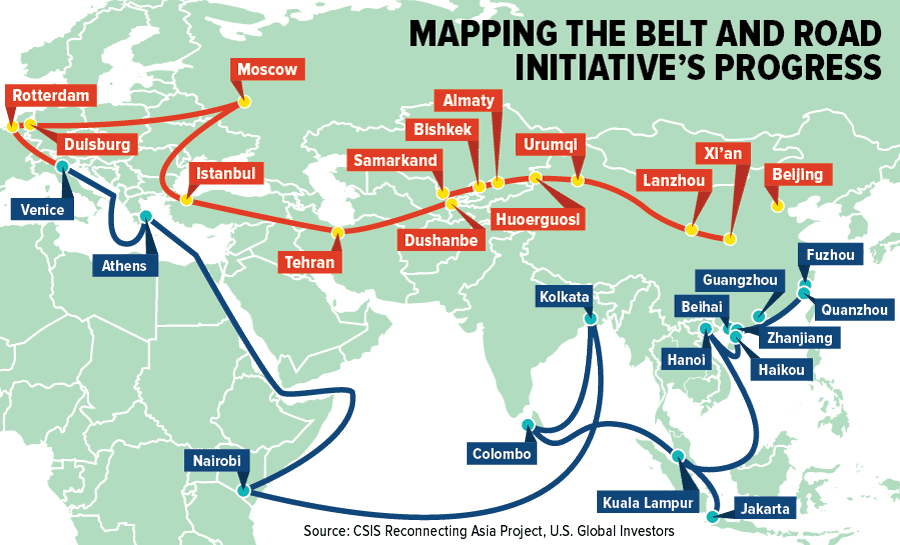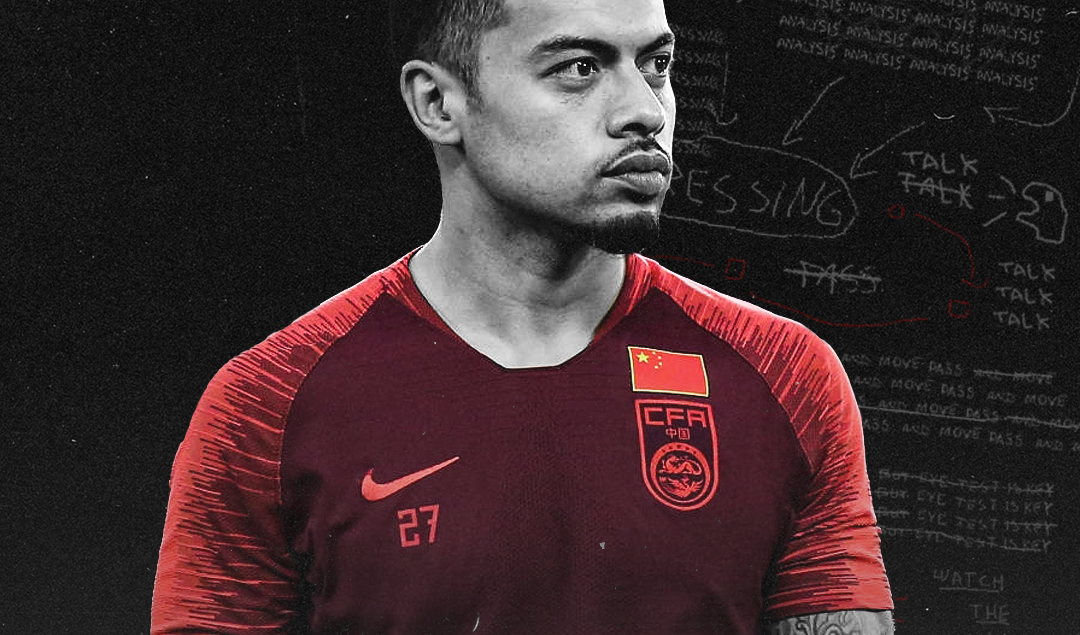Multiculturalism in the Chinese National Team
你好!你好吗? (Nǐ hǎo! Nǐ hǎo ma?) This is Mandarin Chinese, the most widely spoken language in the world. I hope you are OK. The last time we officially went to North America, but our destiny was the non-contiguous states conforming the American Union and why they were neglected in US professional football.
This week we arrive in Asia, because today marks a new year in the agricultural calendar, according to its literal meaning (农历新年 (nónglì xīnnián)), and today is a celebration called Spring Festival (春节(chūnjié)). The rest of the world knows it as the Chinese New Year, which is the beginning of the Year of the Ox, the year 4719.
Musical Recommendation 1
Due to the topic of this text, I experienced several troubles when choosing a song to enlighten it: picking a Chinese melody or one belonging to minorities. So I decided to blend the best of both worlds and the result is this song: 大漠 (Dàmò), “Great Dessert” in English, performed by the dizi maestro Ma Di (马迪, Mǎ Dí). This is about the desert located in Northern China, the Gobi desert, which serves as a border with Mongolia and takes us back to the times of the Silk Road.
This is a translation of the text published in El Nueve y Medio called Multietnicidad en la selección china. You can read it here.
Chinese Domination in Sports… What About Football?
China is a country that has been gradually gaining importance due to the crucial role played at geopolitics and the economy during the last years. This powerhouse had been grilling its rise since the Chinese Revolution in 1949 brought the Chinese Communist Party and Mao Zedong (毛泽东, Máo Zédōng) to power. It is not a surprise that the fruits of that event are reaped after more than half-century.
Sports are just a reflection of this power: a key player in Olympic Games after a comeback to the scene in Los Angeles 1984, since Barcelona 1992 China has been one of the four Apocalypse riders, and we must not forget that they were a host of the 2008 edition, in the capital, Beijing, when China topped the medal rank. China is an unquestioned powerhouse in gymnastics, shooting, taekwondo, diving, table tennis and badminton. Next year Beijing will be again hosts, this time of the Winter Olympic Games.
Football enjoys broad popularity among the population. The Chinese audience receives the massive transmissions of the main European championships and the world and European championships. Chinese billionaires have also penetrated in clubs, for example:
- Suning Holdings Group, Consortium of Zhang Jidong (张近东, Zhāng Jìndōng), owner of the 68,5% of Inter Milan stocks
- Guo Guangchang (郭广昌, Guō Guǎngchāng), CEO of Fosun International, owner of Premier League side Wolverhampton Wanderers.
- Gao Jisheng (高继胜, Gāo Jìshéng), owner of 80% of Southampton, in Premier League as well.
- Chen Yansheng (陈厌胜, Chén Yànshèng), in charge of Rastar Managerial Group, owner of Espanyol in Spain.
- Jiang Lizhang (蒋立章, Jiǎng Lìzhāng), owner of Granada, also of the 90% of Chongqing Dangdai Lifan FC (重庆斯威, Chóngqìng Sīwēi), a club of Chinese top tier.
Besides, the Chinese SuperLeague, or CSL (in Mandarin, 中超联赛 Zhōngchāo Liánsài) ranks sixth in the football league with most followers, below Mexican Liga MX. Unfortunately, this has not translated in the Chinese national team: barely a qualification for the only World Cup so far to be played in Asian soil (2002), failing to make it to the semifinals in the Asian Cup since 2004 (hosts), this is a testimony of a side wishing to ascend to the elite.

Photo: Xinhua
China… Land of the Chinese?
We have plenty of jokes about the hugeness of the population in the People’s Republic of China: around the sixth part of the world population (1.4 thousand million people) are Chinese citizens living in a 9.5 million square kilometre territory.
Many people think that China is the home of only ethnical Chinese. This argument goes off the rails because of the geographical features – borders with 14 countries, plenty of climates and regions. It follows that this diversity is seen in the population. The Chinese government officially recognises 56 ethnicities, even though the number might be higher.
The biggest ethnicity in China is Han Han (汉族, Hànzú): 91,5% of the population belongs to this ethnicity. Furthermore, the colloquial name of Mandarin Chinese is hanyu (汉语, hànyǔ), the language of the Han ethnicity. The remaining 55 ethnic groups are considered by the Chinese government as minorities (少数民族, shǎoshù mínzú), each one with its own customs and languages.
The biggest non-Han 10 ethnic groups:
Zhuang (壮族, Zhuàngzú/Bouxcuengh), the biggest ethnic group, living in Guangxi. The Zhuang speak a language similar to Thai, cultivate rice using oxen and buffalos and beat bronze drums.
Hui (回族, Huízú/خُوِذُو), descendants of Arab and Persian merchants from the Silk Road. The Hui follow the Islam principles; for example, they do not eat pork, the most popular type of meat in China.
Manchu (滿族, Mǎnzú, ᠮᠠᠨᠵᡠ, Manju). Located in the north, the Manchus have affected prominently the Chinese history, like Jin and Qing dynasties.
Uyghurs (维吾尔, Wéiwú’ěr/ئۇيغۇر, uyghur), the most important Turkic ethnicity. Most of them live in Xinjiang, in the northeast. Their religion is Islam as well and they are the authentic bridge to Central Asia.
Miao (苗族, Miáozú, Hmongb); located in Yunnan, their main feature is handcraft, such as paper-cut.
Yi (夷族, ꆈꌠ); they live in the mountainous, rural regions of Southern China and Northern Vietnam. The Yi comprise six sub-ethnicities.
Tujia (土家族, Tǔjiāzú/Bifzivkar/Mongrzzir): located in Central China, they believe in the supernatural influence of gods and rely on agriculture and fishery to survive economically.
Tibetans (藏族, Zàngzú/བོད་པ, Bod pa): they live in the region of the same name, the highest one in China. They practise Tibetan Buddhism and their history is synonymous of a strong resistance to Chinese invasion, mainly the Dalai Lama.
Mongols (蒙古族, Měnggǔzú, ᠮᠣᠩᠭᠣᠯᠴᠤᠳ). There are twice as many Mongols in China than there are in Mongolia. They are heirs of an ancient warrior tradition and a relationship with horses.
Dong (侗族, Dòngzú, Gaeml): located between Hubei, Hunan and Guizhou regions (central China), their rice, woodwork and architecture is unique among China.
China has stood out in every realm this country focuses on, and many of the superstars are members of the Han ethnic group; nevertheless, there are some valuable exceptions: the heroine Hua Mulan (花木兰, Huā Mùlán) was probably Xiaobei, nowadays Tujia; the pianist Lang Lang (郎朗, Láng Lǎng) belong to Manchus, while the gymnast Li Ning (李宁, Lǐ Níng) comes from the Zhuang.
Chinese Ethnic Minorities and Football
This situation can be seen also in this sport. The China national team normally calls Hans, but due to poor results, there has been set an ambitious plan to massify the football practise throughout the Chinese territory, as part of the “One Belt, One Road” initiative (一带一路, Yídài Yílù), which aims to develop the forgotten West in order to connect China with Eurasia. As a collateral consequence, people outside the Han ethnic group have worn the national shirt.

Photo: CSIS Reconnecting Asia Project
The main examples are: Zhao Junzhe (肇俊哲, Zhào Jùnzhé), Manchu. With 63 caps and 2 goals, this fullback was key in the second place of the 2004 Asian Cup.
Jin Jingdao (金敬道, Jīn Jìngdào/김경도, Kim Gyeong-do) & Piao Cheng (朴成, Piáo Chéng/박성, Park Sung), ethnic Koreans. Despite never cracking into the senior team, all of them have impressed at the youth level for China.
An ethnic group that breeds hardworking footballers is the Hui, with the following representatives:
Gao Hongbo (高洪波, Gāo Hóngbō), striker legend at Beijing Guoan (北京国安, Běijīng Guóān), and manager of the China national team (2009-2011, and 2016), he is an old man of the sea called Chinese Superleague.
Cao Yang (曹阳, Cáo Yáng), star of Tianjin TEDA ( 天津泰达, Tiānjīn Tàidá), and Yang Hao (杨昊, Yáng Hào), from Shaanxi Chang’an Athletic (陕西长安竞技, Shǎnxī cháng’ān jìngjì zúqiú jùlèbù).
Wu Lei (武磊, Wǔ Lěi) & Zhang Linpeng (张琳芃, Zhāng Línpéng), both alumni of the Genbao Football Accademy (上海根宝足球基地 Shànghǎi Gēnbǎo zúqiú jīdì) and Shanghai East Club (上海上港, Shànghǎi Shànggǎng).
Zhang has claimed the CSL seven times con el Guangzhou Evergrande (广州恒大, Guǎngzhōu Héngdà); meanwhile, Wu is nowadays the best player in China national team. Besides, he has been a lighthouse of hope in the dark times of the Catalan minnows Espanyol. Wu is the first Chinese in scoring in the Spanish league and in European competitions.
However, the ethnic group that has proven to be critical for the football development in China are the Uyghurs, particularly in an era with a bad reputation due to terrorist attacks by the East Turkestan Islamic Movement, which strives for the Independence of Xinjiang.
Uyghurs have also appeared on the first pages in all newspapers because of the education centres of the Chinese central government in order to take the Muslim religion out of them. This initiative was heavily denounced by the German-Turkish striker Mesut Özil. What happened? The Chinese Central Television called out the broadcast for the Premier League match between Arsenal and Manchester City.

Photo: AP Photo / Francisco Seco
Uyghurs have been increasingly appearing in Chinese football. The regional club, Xinjiang Tianshan Leopard (新疆天山雪豹, Xīnjiāng Tiānshān Xuěbào), plays in the Chinese League Two, third tier. Many of Uyghur footballers have benefited from scholarships to give a shot in the CSL side grassroots sectors.
The Uyghur who broke the ceiling is Mirahmetjan Muzepper (مىراكھمادژون مۇزاففار), also known by his Chinese team Maitijiang (买提江, Mǎitíjiāng). His solid career at Henan Jianye (河南建业, Hénán Jiànyè) earned him not only the captain band in the U-23 team but also to switch sides to Tianjin TEDA, where he was even scouted by Ajax.
His efforts were noticed by the former manager of China, the Italian Marcelo Lippi – he did not only call him for the matches against Qatar and Bahrain for the FIFA World Cup Qualifiers, but in the loss against Qatar 0-1, he sat on the substitute bench and he was sent in at the 76th minute, thus becoming the first Uyghur in playing with the Chinese national football team. Days later, he was in the initial lineup, although he only played in the first half.
Another promising Uyghur is Bari Mohamedali (بارى مەمتىلى), or Bali (巴力, Bālì), who was the first-ever in scoring at the Asian Champions League de Asia with Hangzhou Greentown (浙江绿城, Zhèjiāng Lǜchéng) against the Japanese side Nagoya Grampus. He is now a winger for the Qingdao Huanghai (青島黃海, Qīngdǎo Huánghǎi), who struggles to keep the Chinese Super League status every year.
Foreign-Born Players in China National Team
The concern of Western teams about players born abroad or with foreign background has also arrived in China, in this case because of the poor performances. How is it not possible to form a decent national team with 22 men with such a high population?
Last decade, the situation with the hugest media attention in China was Eddy Francis, o Aidi (艾迪, Àidí), as he is known there. With a Tanzanian father and a mother born in Shanghai, Eddy Francis is the first mixed-raced player being called for any national team. Thanks to a partnership from the Chinese Football Federation, he could play in Portugal with Boavista, only to come back to China after a half-season.
Speaking about Marcelo Lippi, he consented in nationalising foreign-born players to improve the national team. This is why we have Nico Yennaris, the first naturalised player with China. From a Cypriot father and a Chinese mother, Yennadis was in Arsenal academy so he earned caps with England U-17 and U-19 teams. Lost in Championship, at the beginning of 2019 he reached Beijing Guoan. He is now called Li Ke (李可, Lǐ Kě) and so far he has worn the Chinese shirt for five matches.
Since this success, the nationalisation of foreigners has been carried on. For example, Tyias Browning, forged at Everton and with past in Sunderland. When arriving to Guangzhou Evergrande, he received the Chinese name Jiang Guangtai (蔣光太, Jiǎng Guāngtài). FIFA agreed in the permit for playing for China and last year he was called up for the first time, yet he has not made a debut.
Speaking more about Guangzhou Evergrande, we have to mention one of their superstars, Elkeson. The Brazilian has been one of the best players in the Chinese league. Though he was featured with Brazil ten years ago (in a friendly match against Argentina), he did not play. So, there were no problems to play for China. Now known as Ai Kesen (艾克森, Ài Kèsēn), he is the first China national team player with no Chinese background. He has scored thrice in four appearances.

Photo: Ahmed Shurau/AFP/Getty Images
The Chinese fans have been constantly asking for the nationalisation of the Brazilian Alexandre Pato, former Milan striker who now drills nets with Tianjin Tianhai (天津天海, Tiānjīn Tiānhǎi). Unfortunately, he cannot play with China because he was capped for Scratch du Oro from 2008 to 2013. This dramatic request is just a symptom of the mediocrity of football in China.
Plan for Development of Chinese Football for 2050
The President of the People’s Republic of China, Xi Jinping (习近平), is an avid football fan. It is said that before a state visit to the UK, he asked not to be received in London, but in Manchester instead. He attended a training season of Manchester City and took a picture with the then Prime Ministre, David Cameron, and with Sergio Kun Agüero. He even visited the National Museum of Football. The Chinese Cityzen Sun Jihai was inducted as a Hall of Fame member there.
Xi Jinping is indeed concerned about the current situation with Chinese football. So he has launched an ambitious plan for China to conquer the world so to speak. In the short term, there must be a football field for every 10 thousand people in 2030, a year when the China men national team should be among the Asian elite, while the women’s team should be world-class. For 2050, China men’s team must be a world powerhouse and shall contribute to world football development.
This plan may seem unrealistic, yet China will use whatever resource to fulfil the dream of the Secretary of the Chinese Communist Party, even if they employ players either not belonging to the Han ethnic group or born outside the central country, as the real meaning of China in Mandarin. There is also a saying I learnt while I was learning Chinese:
在家靠父母,出外靠朋友 (zàijiā kào fùmǔ, chūwài kào péngyou)
“At home, rely on your parents; away from home, rely on your friends”
Let’s Recap
China has got the power in many fields, such as sports, though football is a pending subject so far because of a single qualification of the World Cup. This is not a fruit of the recent economic engagement, like being the owners of European teams. The national team has traditionally welcomed Han players, but members from Hui ethnic group, Manchus, Uyghurs, ethnic Koreans, outside Chinese and foreign-born players have been capped. Their employment could be increased so that China can reach the world elite for 2050, thanks to a plan by Xi Jinping.
Musical Recommendation 2
To conclude this text, I must say that 2020 is the Year of the Ox. The forecast for this year is a return to nature, family, minimalities and austerity. Ox is the second most important animal in Chinese Zodiac, so its role is to clean up the mess done by the Rat.
I just have to wish you a happy new Chinese year. In Mandarin we say恭喜发财 (Gōngxǐ fācái), which literally means “May you make big money”. I leave you a song for the New Year sung by the Taiwanese Jimmy Lin (林志颖, Lín Zhìyǐng):
See you next time. 再见!(Zài jiàn!)
By: Sebastián Alarcón
Featured Image: @GabFoligno / VCG – Visual China Group
